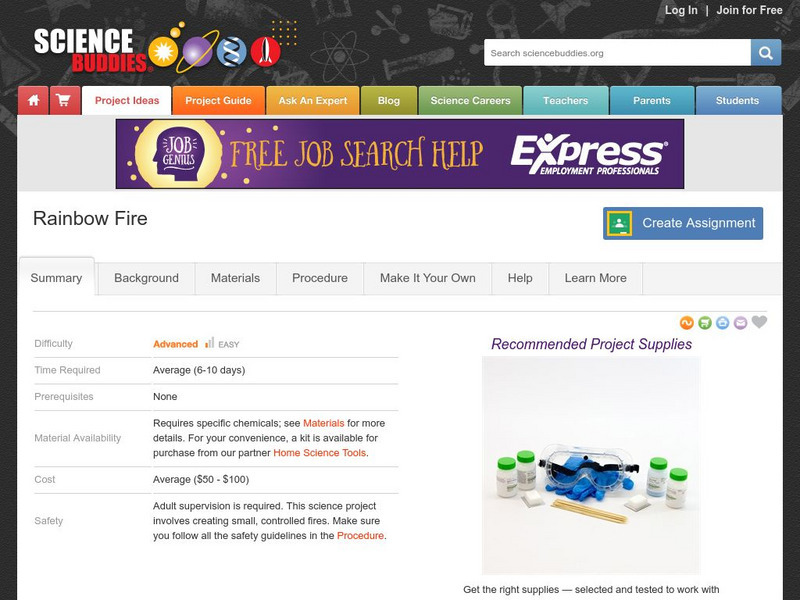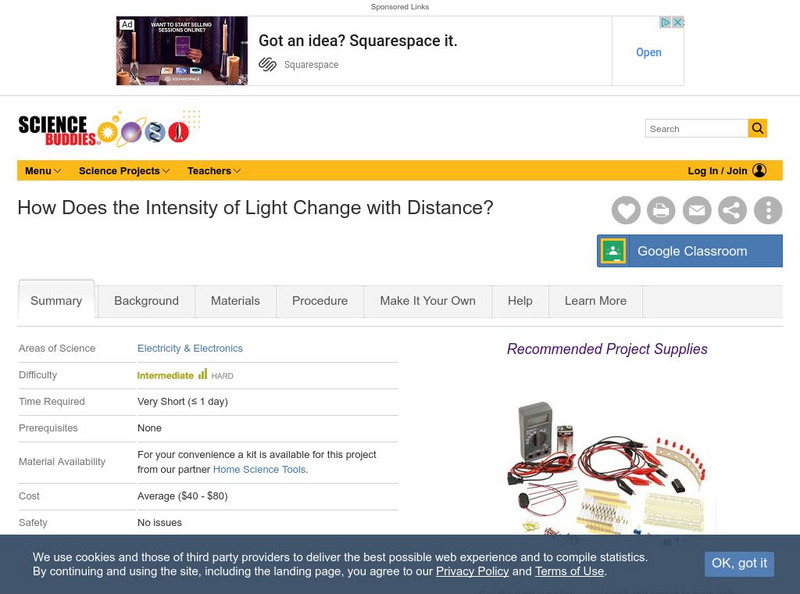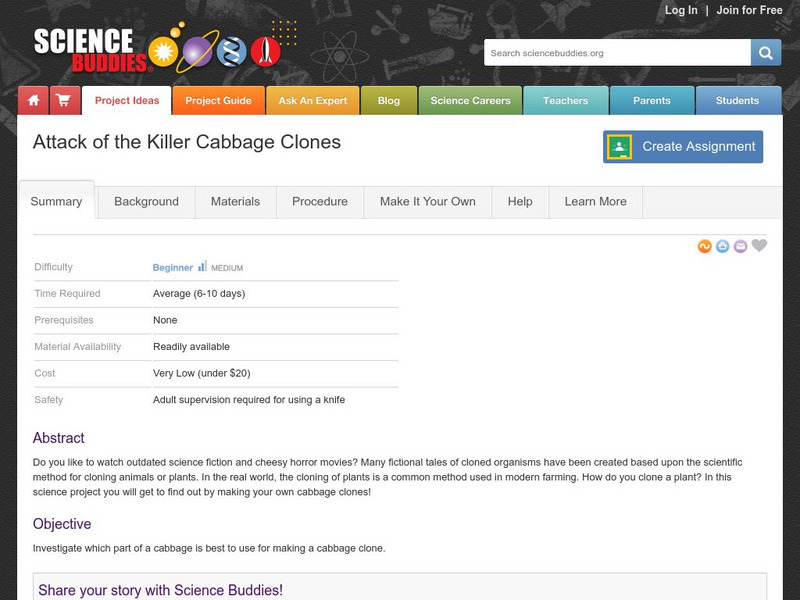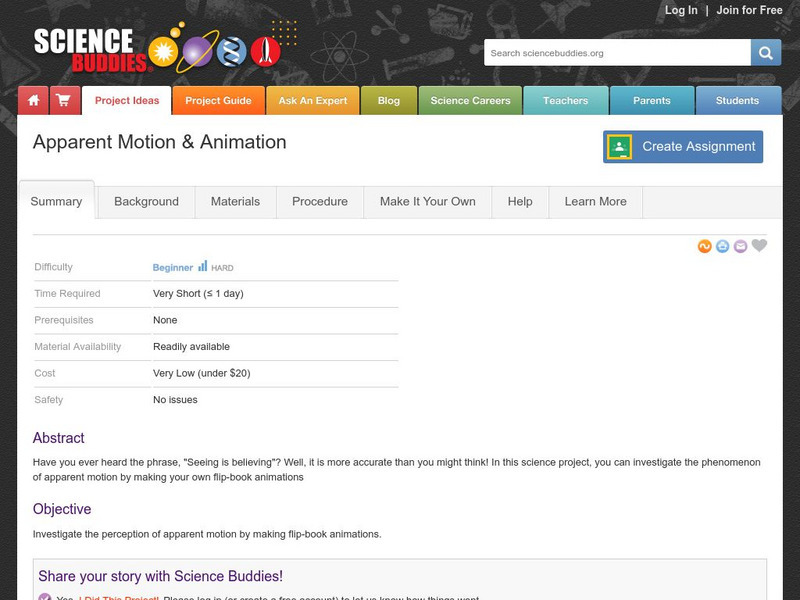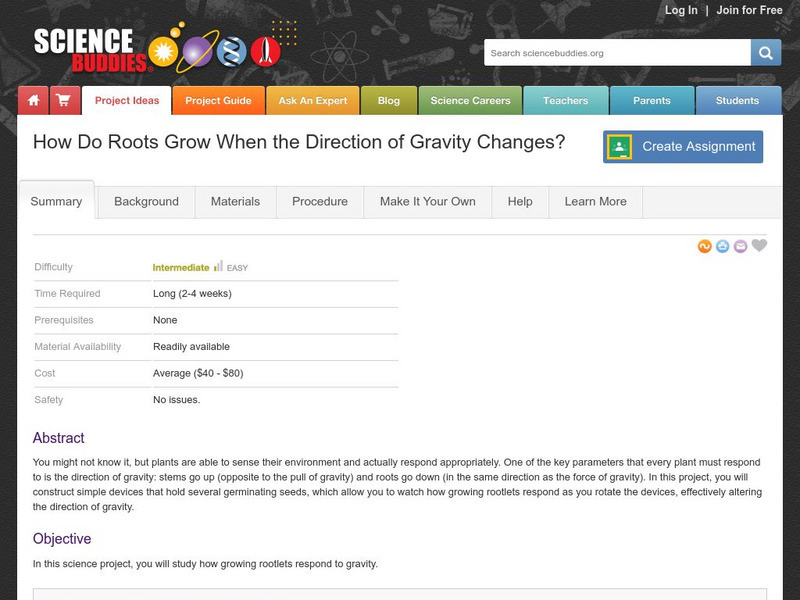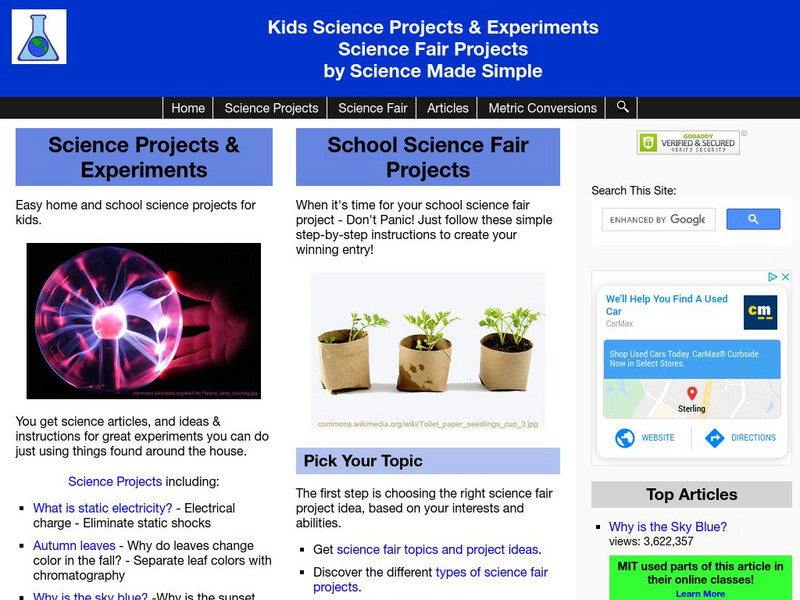Science Buddies
Science Buddies: Artificial Intelligence Teaching a Computer to Play Tic Tac Toe
This is a more challenging JavaScript project. You will have to figure out a way to translate game strategy into a computer algorithm. Directions will show you how to create a working Tic-Tac-Toe board on a webpage. Just by showing the...
Science Buddies
Science Buddies: Caffeine and Heart Rate: A Pharmacological Study Using Daphnia
In this project, water fleas (Daphnia magna), a semi-transparent freshwater crustacean, are used to study the effects of caffeine on heart rate. You do not have to learn how to take a crustacean's pulse though, because you can actually...
Science Buddies
Science Buddies: Bomb's Away! A Ping Pong Catapult
With this project you'll send ping pong balls flying through the air with a rubber-band powered catapult. This catapult makes it easy to reproduce the launch angle, and to measure the amount of force applied to the projectile. Armed with...
Science Buddies
Science Buddies: Image Compression vs. Image Quality: Finding the Best Tradeoff
In this project you'll learn about how digital image files are encoded, and compressed. You will also measure the quality of compressed and uncompressed images, which will give you important insights into the tradeoffs between file size...
Science Buddies
Science Buddies: Rainbow Fire
Astronomers can determine the atomic composition of distant stars by measuring the spectrum of light emitted by the star. Sound cool? Well in this project you can do something similar by observing the color of flames when various...
Science Buddies
Science Buddies: Levitating Magnets: Floating Isn't Just for Magicians
If you ever seen a magician float an object in the air, you might think that levitation is just a magic trick, but the truth is you can use an invisible physical force to levitate a magnet. Try this simple, week-long science project to...
Science Buddies
Science Buddies: Slime Chemistry
Have you ever wondered how fun toys like Silly Putty, Gak, and Slime are made? These products are so much fun because of the properties of polymers, which make them delightfully bouncy, stretchy, sticky, moldable, breakable, hard, soft,...
Science Buddies
Science Buddies: Testing a Parabolic Reflector With Light From an Led
You can see examples of parabolic reflectors in flashlights, car headlights, satellite TV antennas, and even on the sidelines at football games. In this project, you can use an LED and a simple photodector to investigate this concept.
Science Buddies
Science Buddies: Dog Toys: What Makes One a Favorite or a Flop to Fido?
It seems as though dogs, like people, have definite preferences for their play things. This fun project investigates what makes a toy interesting to a dog. In these experiments, you and your dog can have some fun while you learn about...
Science Buddies
Science Buddies: Who Done It? Dna Fingerprinting and Forensics
DNA fingerprinting (also known as DNA profile analysis and DNA typing), is a method of distinguishing between individuals by analyzing patterns in their DNA. This project focuses on the first method of DNA fingerprinting to be developed,...
Science Buddies
Science Buddies: How Does the Intensity of Light Change With Distance?
How far would you have to travel so that the light of the full sun would provide "daylight" no brighter than twilight on Earth? This project describes a method to verify the inverse square law: how light, sound, electrical signals, and...
Science Buddies
Science Buddies: Attack of the Killer Cabbage Clones
Do you like to watch outdated science fiction and cheesy horror movies? Many fictional tales of cloned organisms have been created based upon the scientific method for cloning animals or plants. In the real world, the cloning of plants...
Science Buddies
Science Buddies: Ewww, Dog Breath! Does Active Play Take a Dog's Breath Away?
A project that requires you to play with a dog cannot be all that bad, right? This scientific experiment entails the respiratory functions of dogs. Learn the chemical and bodily processes going on within your canine companions...
Science Buddies
Science Buddies: Liver Stinks!
Sometimes science can be really messy or use pretty disgusting ingredients. That is what it takes to understand how the world works, even if the experiment isn't pretty. If you like chemical reactions that stink and ooze foamy bubbles...
Science Buddies
Science Buddies: Mag Nificent Breakfast Cereal
You will devise a way of testing foods for supplemental iron additives in this experiment provided by Science Buddies. Then you will use your design to test different breakfast cereals to see how much iron they contain. The goal is to...
Science Buddies
Science Buddies: Building Structures: It's a Slippery Slope
All structures require a foundation to keep them from falling down. This is especially important when a structure is built on a hill or on a slope. In this science project, you will build a tower of Lego Duplos on slopes with different...
Science Buddies
Science Buddies: Thinking in (Semi )Circles: The Area of the Arbelos
The arbelos is the white-shaded region between the three semicircles in the illustration at right. In this project, you'll prove an interesting method for determining the area of the arbelos.
Science Buddies
Science Buddies: Apparent Motion & Animation
This project investigates the phenomenon of apparent motion by making your own flip-book animations. This optical illusion experiment, while fun and short, will prove to be a very eye opening experience.
Science Buddies
Science Buddies: How Do Roots Grow When the Direction of Gravity Changes?
You might not know it, but plants are able to sense their environment and actually respond appropriately. One of the key parameters that every plant must respond to is the direction of gravity: stems go up (opposite to the pull of...
Science Buddies
Science Buddies: Veggie Snap! Modifying Bending Stresses in a Flexible Rod
Examples of the effect of bending stresses on flexible rods could include a large tree bending over to the ground, or a fishing pole bending till it snaps. Scientists actually study this phenomenon and discover ways to prevent breakage,...
Science Buddies
Science Buddies: Riding on Air Build a Real Hovercraft
You will get to build a working hovercraft that will glide over surfaces on a cushion of air in this week long science project. With the use of some power tools, you will create your hovercraft, and ultimately understand how air...
Other
University of Richmond: Archimedes Initiative
The Archimedes Initiative is home to thematic videos on aspects of the inquiry cycle. With coverage of the ins and outs of science fair projects and video interviews of science fair participants who discuss their projects, discoveries,...
Bill Nye
Bill Nye: Bill Nye Online Science Lab
Bill Nye's Online Science Lab offers home demos for planetary, physical, and life science, a "Question of the Week," e-cards, episode guides, and lots of fun facts. A great resource for students looking for science-fair project or lab...
Science Made Simple
Science Made Simple: Science Made Simple
This website houses kids science projects and experiments, science fair projects and science articles.
Other popular searches
- Science Fair Projects Ideas
- Science Fair Projects Topics
- Motion Science Fair Projects
- Coke Science Fair Projects
- Food Science Fair Projects
- Sports Science Fair Projects
- Cool Science Fair Projects
- Csi Science Fair Projects
- Edible Science Fair Projects
- Casi Science Fair Projects




